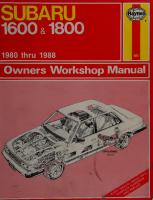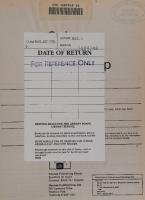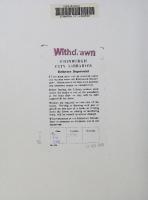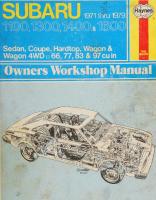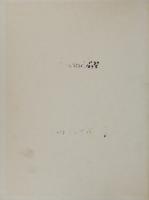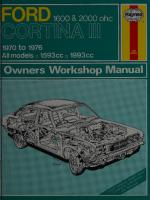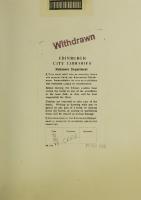Haynes Subaru 1600 & 1800 Owners Workshop Manual 1850104344, 9781850104346
“328 pages : 28 cm Includes index”.
145 20 33MB
English Pages 336 Year 1988
Recommend Papers

- Author / Uploaded
- Larry Holt
- John H. Haynes
- Similar Topics
- Technique
- Transportation: Cars, motorcycles
File loading please wait...
Citation preview
at Terr ¥| DaveYey. © HA YNES.
Subaru Owners Workshop Manual Larry Holt and John H Haynes Member of the Guild of Motoring Writers
Models covered All Subaru 1600 & 1800 Series 2 models (inc. MV) with 2WD and 4WD 1595. CC, L781. sc Does not cover L-Series or XT range
ISBN 1 85010 434 4 © Haynes Publishing Group 1983, 1988 All rights reserved. No part of this book may be reproduced or transmitted in any form or by any means, electronic or mechanical, including photocopying, recording or by any information storage or retrieval system, without permission in writing from the copyright holder. Printed in England
(995-70N7)
ABCDE FGHIJ
Haynes
Sparkford
Publishing
Group
Nr Yeovil
ae Holt, Larry
F Haynes
861
t
Publications,
Lawrence
Drive
1600
workshop
1,
629.28'722 USA
& 1800 ‘79 to ‘87 owners
manual. — (Owners Workshop
Manuals).
Automobiles — Maintenance and repair
|. Title
Newbury Park California 91320
Subaru Inc
ll. Haynes, J. H.
TL152
ISBN 1-85010-434-4
lll. Series
Acknowledgments Thanks are due to Fuji Heavy Industries Ltd. of Japan, who gave us permission to reproduce certain illustrations and provided technical information.
The Champion Sparking Plug Company of spark plug conditions.
provided the illustrations
About this manual /ts purpose The purpose of this manual is to help you get the best value from your vehicle. It can do so in several ways. It can help you decide what work must be done even if you choose to get it done by a dealer service department or a repair shop; it provides information and procedures for routine maintenance and servicing; and it offers diagnostic and repair procedures to follow when trouble occurs. It is hoped that you will use the manual to tackle the work yourself. For many simpler jobs, doing it yourself may be quicker than arranging an appointment to get the vehicle into a shop and making the trips to leave it and pick it up. More importantly, a lot of money can be saved by avoiding the expense the shop must pass on to you to cover its labor and overhead costs. An added benefit is the sense of satisfaction and accomplishment that you feel after having done the job yourself.
Using the manual The manual is divided into Chapters. Each Chapter is divided into numbered Sections, which are headed in bold type between horizontal lines. Each Section consists of consecutively numbered paragraphs.
Introduction
The two types of illustrations used (figures and photographs), are referenced by a number preceding their captions. Figure reference numbers denote Chapter and numerical sequence in the Chapter; i.e. Fig. 12.4 means Chapter 12, figure number 4. Figure captions are followed by a Section number which ties the figure to a specific portion of the text. All photographs apply to the Chapter in which they appear, and the reference number pinpoints the pertinent Section and paragraph; i.e. 3.2 means Section 3, paragraph 2. Procedures, once described in the text, are not normally repeated. When it is necessary to refer to another Chapter, the reference will be given as Chapter and Section number; i.e. Chapter 1/16. Cross references given without use of the word ‘Chapter’ apply to Sections and/or paragraphs in the same Chapter. For example, ‘see Section 8’ means in the same Chapter. Reference to the left or right side of the vehicle is based on the assumption that one is sitting in the driver's seat facing forward. Even though extreme care has been taken during the preparation of this manual, neither the publisher nor the author can accept responsibility for any errors in, or omissions from, the information given.
to the Subaru
The Subaru line of vehicles, manufactured by Fuji Heavy Industries Ltd. of Japan, is one of the most versatile of all vehicles currently available. Although Subaru models have been available in both the US and UK for a number of years, this OWM is involved with only those vehicles produced in 1980 and later. Models built prior to 1980 are the subject of another Haynes manual. Subaru vehicles can be purchased in a number of forms and trim levels. In North America the most popular versions include 2-door and 4-door hatchbacks, station wagons and the unique pick-up truck called
the Brat. The UK has a similar line of saloons, hardtop coupes and the MV pick-up truck. One feature which helps to separate Subaru from other vehicle
manufacturers is the use of four-wheel drive (4WD), available on most models. Subaru is the worldwide innovator in 4WD passenger cars. As mentioned above, in addition to body form, Subarus can be purchased in a variety of trim levels with many options. Optional equipment includes items such as a digital display instrument panel and the revolutionary Hill-holder device which prevents the vehicle from rolling backward when accelerating from a stop on a hill.
Contents Page
Acknowledgments
2
About this manual
2
Introduction to the Subaru
é
General dimensions
8
Use of English
9
Buying parts
10
Vehicle identification numbers
11
Maintenance
12
Automotive
techniques, tools and working facilities chemicals and lubricants
18
Jacking and towing
19
Safety first!
20
Troubleshooting
21
Chapter 1 Tune-up and routine maintenance
28
Chapter 2 Engine
:
57
Chapter 3 Cooling, heating and air conditioning systems
88
Chapter 4 Fuel and exhaust systems
99
Chapter 5 Engine electrical systems
120
Chapter 6 Emissions control systems
:
134
Chapter 7 Transmissions
145
Chapter 8 Driveline
170
Chapter 9 Brakes
181
Chapter
10
Chassis electrical system
202
Chapter
11
Suspension and steering systems
246
Chapter
12
Bodywork
270
Ee RR ee Chapter 13 Supplement:
I Conversion factors a Index
298
Revisions and information on later models
eee
ee a
ee
2
ee
eee
eee
eee
ee
ee
ee 323 324
(uMoUs Sjapow UeDeWY
YYOR)) (pUNCIBy49eq) UOBeM 7q pue (punos6a10}) uoBem 75 nieqns ay
su
nueqns
yoequd}ey Sjapow YON)
UBDHAaWYSjepow (umoUs
(umoys UOIsIaA yf) UOO|ES 41D OOOL MeGns euL
(UMOYUS AINA) HN 24} Ul AI OU Se pue EQUEWY YYOR Ul }e1g 84} Se UMOUY 49NJ} dn-yoId Nieqns ayy
General
dimensions
For modifications, and information applicable to later models, see Supplement at end of manual Length (overall) Hatchback
156.9 in (3985 mm)
(DL-2WD)
Hatchback (GL-2WD) Hatchback (All 4WD)
157.9
in (4010
157.3
in (3995 mm)
mm)
Sedan: andi hardtop (DIL) \ cscs cccosssscccestecceosutc teeter athe ake eee nner aes
167.3 in (4250 mm)
pedan and hardtop (GL))......csaca:sssssccatsnsevceseessuans settreteety esceemretees. ts.vrei eeee
168.1
Station: wagon:
168.5 in (4280 mm) 169.3 in (4300 mm)
(DL=2WD)).c:Sc...cecscccuereecs: toned tee astee ESE, ocat vccsttodes
in (4270 mm)
Station: wagon (GE-2WD))..cc..N..
